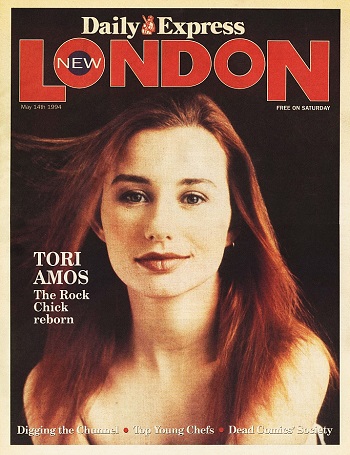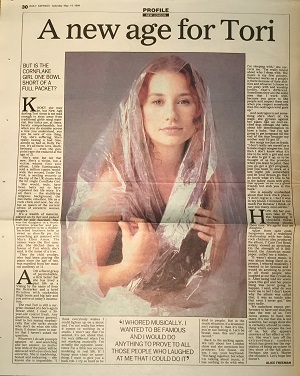|

songs | interviews | photos | tours | boots | press releases | timeline
Daily Express: New London (UK)
May 14, 1994

A new age for Tori
by Alice Freeman
photo by Cindy Palmano
Kooky she may be, but New Age darling Tori Amos is not mad enough to stray away from traditional girlie song material. Her lyrics are, at times, barely comprehensible, but when you do stumble across a line you understand, you can be sure of one thing. Yep, she's suffering. She's really having a bad time, almost as bad as Dolly Parton. It's all there, love, death, betrayal -- even the gun-point rape she endured at the age of 21.
She's new, but not that new. She's a victim, but a victim whose first solo album, Little Earthquakes, sold a million copies worldwide. Her second, Under the Pink, is nestling securely at the top of the UK charts with the hit single "Cornflake Girl."
She would, truly, have been batty not to have exploited her life story. It's all there -- the stultifying religious background, the inevitable rebellion, life as a rock chick and now, her status as queen of the current coven of eccentric women singers.
It's a wealth of material, played on by her and picked over by pop fanzines. She was the daughter of a North Carolina preacher and pre-programmed to be a double-barrelled Southern belle as sweet as shoo-fly pie. But something got jammed with Myra Ellen Amos. The names were the first casualty. She ditched them in favour of Tori which, she's said, is the name of a tree.
Then the child prodigy, who had been playing the piano since the age of two, was expelled from her musical academy at 11.
Add a fluent grasp of psychobabble, a firm belief that she has lived a past life as a Viking by the name of Sven the Berzerker and a brief flirtation with snakeskin thigh boots and big hair and you arrive at today's incarnation.
The real Tori is still a surprise. Instead of a born-again flower child, I meet a 30-year-old control freak. Any questions, however general, lead to her saying emphatically that she sacks people who don't do what she tells them. It doesn't seem to matter that I haven't asked the question.
Whatever I do ask prompts agonies of soul-searching and her answer, no matter how wide of the point, will be delivered with eyes stretched sincerely. She is maddening, honest and endearing -- she knows she is impossible. "I think everybody wishes I could lighten up on a music end. I'm not really fun when it comes to working in a studio. I won't say that I'm unkind, it's not about that. I'm very different when I'm not working musically. I'm actually the opposite, sometimes I'm a little too accommodating in real life. If I bump your chair or something, I want to give you a back rub. I try so hard to be kind to people. But in the music situation, if a drummer isn't cutting it, then it's like, you're not cutting it. Let's be brutal, man, this ain't your record."
Back to the sacking again. We talk about her London show and she mentions her producer, Eric Rosse. Ah yes, I say, your boyfriend. "We hang together, but when I'm talking about music, it has nothing to do with who I'm sleeping with," she corrects me. "I'm really brutal about who I sleep with. The music is my first priority. Whoever works on a project is there because of their abilities and whoever I choose to run away with and worship bodily, that's different. Sometimes they are the same men that I work with, because you grow to like people and respect them and when you respect somebody then the oestrogen level goes up."
And oestrogen is not something she's short of. On stage, she gyrates against her piano like an over-excited dog, offstage she talks about her determination to have a baby, "but I'm not going to get pregnant till the end of the tour because my mother said I'd get ill."
Her songs are just as frank. "I don't really see myself as a female singer songwriter, but then I don't know what it's like to be with a girl and not be able to get it up, or to be thought of as the provider when you want to paint, then you go get a girl pregnant, and you have to work at a late night job somewhere and let your dream go. But I do know what it's like to be in the ladies' room with girls that appear to be very good friends but stab you in the back."
She is equally unabashed about that rock chick phase. "I don't regret it, I feel it was in my blood. I listened to too much Pat Benatar I think, or saw too many mini-series."
How did her parents take it? "In the beginning it shocked them. Nothing shocks them now. We agree that we disagree."
Apart from split ends, hangovers and a redefined relationship with her folks, rock chickery also produced the album, Y Kant Tori Read, widely viewed as atrocious. On the strength of it Billboard, the American music paper, called her a bimbo.
"It wasn't about music, it was about being liked as a person. I whored musically. I wanted to be famous and I would do anything to prove to all those people who laughed at me that I could do it. After being told for seven years this girl and her piano thing was never going to happen, I said, what do you want me to be? I don't know why the album was called that, it was an inside joke that even I never got," she says sadly.
We somehow expect performers to have one skin less than the rest of us. Tori Amos seems to have one more. It's not that she is not sensitive, her songs show she is certainly attuned to something which escapes the rest of us, but she appears unaware of her effect on others. She won't turn off the extraordinary candour which has given her the reputation of being an octave or two short of the full piano. Perhaps she can't. Maybe she shouldn't. Let's hope she doesn't.
original article

[article shared by Samantha Free]
[transcribed by jason/yessaid]
t o r i p h o r i a
tori amos digital archive
yessaid.com
|